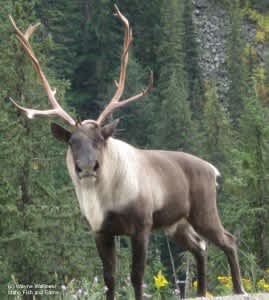USFWS Protects More Than 375,000 Acres in Idaho and Washington for At-Risk Species
OutdoorHub 11.30.11

Priest Lake, ID – Endangered woodland caribou will be protected across 375,562 acres in the Selkirk Mountains of northern Idaho and northeastern Washington, thanks to a critical habitat designation handed down today by the U.S. Fish and Wildlife Service. The long-awaited decision is the result of action taken by Defenders of Wildlife, Lands Council, Selkirk Conservation Alliance and Center for Biological Diversity.
“Christmas has come early for America’s only reindeer relative,” said Mike Leahy, Rocky Mountain director for Defenders of Wildlife. “Critical habitat is an essential tool for recovering endangered species like the woodland caribou, and they deserve our best efforts. To protect endangered animals, we must protect the places they live.”
Only one small herd of Woodland caribou remains in the U.S. Fewer than 50 survive in the border region between northern Idaho and British Columbia.
The woodland caribou is perhaps the most endangered species in the continental United States. The southern Selkirk herd of the caribou, which is the only one to occur in the lower 48 states, consists of about 45 animals. The southern Selkirk herd belongs to a unique mountain dwelling form of caribou known as the “mountain ecotype” that, unlike other woodland caribou, do not form large herds or make large migrations. Instead, these caribou migrate between low and high elevation forests.
“The woodland caribou of the Selkirk Mountains are highly endangered and need this habitat protection to survive,” said Tim Layser, a wildlife biologist with the Selkirk Conservation Alliance. “Protecting the caribou means protecting the old-growth forests and wild places of the Selkirks, which are cherished by many.”
Thousands of woodland caribou once roamed the northern United States but were eliminated from all of their habitats except the Selkirk Mountains by a combination of logging of their old-growth forest habitats, hunting and poaching, and roads. They continue to be threatened in their last habitat in the U.S. by disturbance from snow mobiles and other winter recreation.
“With today’s designation of critical habitat, the woodland caribou has a shot at survival,” said Noah Greenwald, endangered species director at the Center for Biological Diversity. “Woodland caribou are one of the many hidden treasures of the Idaho Panhandle and are definitely worth saving.”
Background:
The conservation groups petitioned for critical habitat in 2002 and sued for the designation in 2009. In 2005, the conservation groups challenged grooming of snow mobile trails into caribou habitat on the Idaho Panhandle National Forest and obtained an injunction on snow mobile travel and trail grooming in a small portion of the forest that is essential for the caribou. Much of that habitat has now been designated as critical habitat, ensuring these protections will be maintained.

